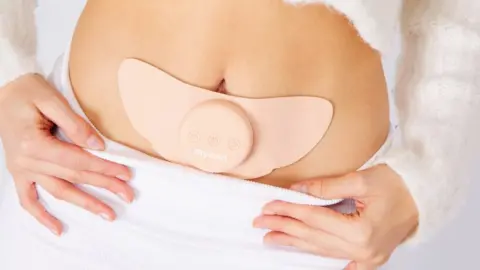The new tech offering relief from the misery of period pain
 Paula Fischer
Paula FischerWhen Paula Fischer first read about the development of a wearable bodysuit that helps to relieve menstrual pain, the 33-year-old says she was "very excited to try it".
Like many women, she experiences severe discomfort during her periods, and she was hoping to find an alternative solution to painkillers, which only helped for a couple of hours.
"I was often in so much pain during my periods that I couldn't get up from the couch to do my work," says Paula, who lives in Budapest, Hungary. "This affected everything - my mood, motivation, my ability to perform."
Then two years ago, she saw a notice on social media from a Hungarian start-up called Alpha Femtech, asking for volunteers to help in the testing and development of a new bodysuit that aims to reduce period pain.
Applicants had to complete a survey about their menstrual cycle, and then a doctor who specialises in women's health chose the most suitable participants. Paula was one of those picked.
The resulting bodysuit, called Artemis, will be available to buy in the UK and the EU for the first time later this year. It works via built-in heat panels and tens (transcutaneous electrical nerve stimulation) gel pads.
 Marton Martos
Marton MartosThe latter, which are often used by women during childbirth, emit electrical pulses. These are said to block pain signals from reaching the brain. Meanwhile, the heat panels soothe the uterus and surrounding muscles.
To power the bodysuit the user attaches a small, palm-sized, combined battery pack and tens machine that fits in a small pocket on the suit, or can just be clipped on. This then connects wirelessly by Bluetooth to an app on the user's smartphone, which is used to adjust both heat and electricity levels.
Paula says that when she wore the bodysuit during testing her periods were "a completely different experience", with little to no pain. She adds that the bodysuit's material, which is made of a blend of merino wool and artificial fibres is "comfortable... nice to wear".
The only side effect she says she had was that her period was heavier than usual. "I assume due to the muscle-relaxing effects."
The bodysuit is the brainchild of Alpha Femtech's co-founder Anna Zsofia Kormos, who has a doctorate in wearable smart tech, focusing specifically on menstrual health. Her business partner, Dora Pelczer, comes from a marketing background.
"We spoke to 350 women about their menstrual habits, so that we could develop the most user-friendly product," says Ms Pelczer. She adds that she and Ms Kormos wanted the €220 ($240; £194) bodysuit to look more like a fashion item than a medical device.
Dubliner Rebecca Powderly not only has painful periods, but she also has to endure a medical condition called endometriosis.
Said to affect one in 10 women, endometriosis occurs when tissue similar to the lining of the womb grows elsewhere inside the body, such as around the ovaries and bladder. This build-up leads to internal lesions and scars, and the pain can be extreme.
To try to offer herself some comfort, Rebecca says she used to walk around with a hot water bottle. The 28-year-old would even do so on nights out, which she says resulted in her getting "a few odd looks".
But since September, Rebecca has swapped the hot water bottle for another wearable tech product that has been designed to reduce period pain.
 Rebecca Powderly
Rebecca Powderly Called the Myoovi, it is a small, wireless tens machine that the user sticks on her skin either below the belly button or on the lower back.
A disc-shaped central unit with a diameter of around 8cm (three inches) houses a tens gel pad, a USB-charged battery, and the control buttons. This slots into a replaceable strip of butterfly-shaped fabric, which, like a large plaster, is sticky on one side, and is said to be good for between 20 and 30 uses before you need to use another one.
"The tens is a strange sensation alright," says Rebecca. "It is a hard one to describe. On the higher settings the pulses can get intense, but it really does work for my pain.
 Myoovi
Myoovi "For me the pain relief kicks in instantly. It doesn't completely get rid of the endo stabbing pains I get, but it does reduce them. I find the biggest relief I get is from the constant, dull cramping pain I experience."
The Myoovi was launched in October 2021, with prices from £60. For that you get one of the discs, and two of the sticky strips.
The product is made by a Manchester-based start-up of the same name. Its chief executive, Dr Adam Hamdi, came up with the idea after seeing the effectiveness of tens machines first-hand while working for the NHS.
He wanted to create a portable, discreet version with no wires, so women with period paid, endometriosis, or another condition called polycystic ovary syndrome, could use it anywhere.


New Tech Economy is a series exploring how technological innovation is set to shape the new emerging economic landscape.

Dr Karen Morton, an obstetrician and gynaecologist, and founder of Dr Morton's medical helpline, explains how tens machines work. "They use the 'gating theory of pain' - by putting a stimulus into the spinal cord above where the pain comes in, they block the route of the pain from getting to your brain," she says. "Heat can do the same thing."
However, she stresses that any women suffering from bad period or other gynaecological pain should first get the matter medically investigated.
Dr Steve Allder is a consultant neurologist - a doctor who diagnoses and treats diseases of the brain, spinal cord and wider nervous system.
He says that while studies have shown that tens machines are effective in reducing pain, there are potential issues to using them. "It's not exactly clear what the optimal duration, number, and frequency of treatments are, because of the possibility of the development of habituation and tolerance in repeated usage of tens."
Dr Hamdi from Myoovi insists that there is no limit on how long such tens devices can be used, and that it instead depends on how comfortable the person is with the electrical sensation.
Back in Budapest, Paula says she is keen to get an Artemis bodysuit that she won't have to hand back. "I can't wait for it to be on the market so I can finally use it regularly."
